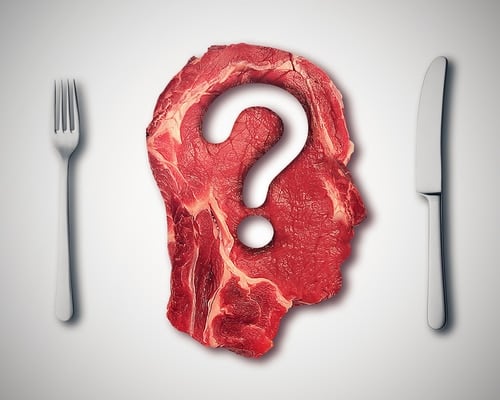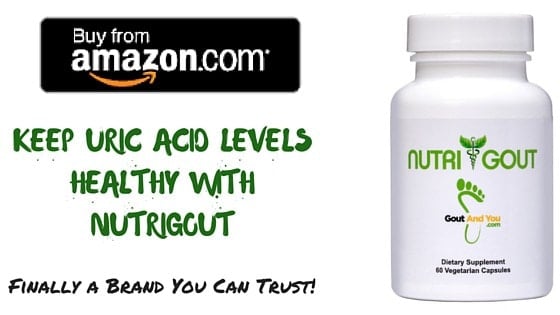What Are Purines And Which Foods Are To Be Avoided In A Gout Diet
When I was diagnosed with gout, I remember researching on the net about it and coming across this keyword that kept popping up article after article, this word was “purines”. When reading or hearing this word, my brain has this strange association with Purina Cat Chow even to this day! So what is this “purines”, what does it consist of and why must gout sufferers cut down on it, if they want to lower their uric acid levels.
A great article explains this natural substance very well:
“Purines are natural substances found in all of the body’s cells, and in virtually all foods. The reason for their widespread occurrence is simple: purines provide part of the chemical structure of our genes and the genes of plants and animals. A relatively small number of foods, however, contain concentrated amounts of purines. For the most part, these high-purine foods are also high-protein foods, and they include organ meats like kidney, fish like mackerel, herring, sardines and mussels, and also yeast.”
It then goes on to explain how purines are metabolized into uric acid:
“When cells die and get recycled, the purines in their genetic material also get broken down. Uric acid is the chemical formed when purines have been broken down completely. It’s normal and healthy for uric acid to be formed in the body from breakdown of purines. In our blood, for example, uric acid serves as an antioxidant and helps prevent damage to our blood vessel linings, so a continual supply of uric acid is important for protecting our blood vessels.
Uric acid levels in the blood and other parts of the body can become too high, however, under a variety of circumstances. Since our kidneys are responsible for helping keep blood levels of uric acid balanced, kidney problems can lead to excessive accumulation of uric acid in various parts of the body. Excessive breakdown of cells can also cause uric acid build-up. When uric acid accumulates, uric acid crystals (called monosodium urate crystals) can become deposited in our tendons, joints, kidneys, and other organs.”
A low purine diet may be beneficial for us gout sufferers:
“Because uric acid is formed from the breakdown of purines, low-purine diets are often used to help treat conditions like gout in which excessive uric acid is deposited in the tissues of the body. The average daily diet for an adult in the U.S. contains approximately 600-1,000 milligrams of purines.
Recent research by Choi and others has shown that the impact of plant purines on gout risk is very different from the impact of animal purines, and that within the animal food family, purines from meat and fish act very differently than purines from dairy. Choi’s work has demonstrated that purines from meat and fish clearly increase our risk of gout, while purines from vegetables fail to change our risk. Dairy foods (which can contain purines) actually appear to lower our risk of gout. In summary, this epidemiological research (on tens of thousands of men and women) makes it clear that all purine-containing foods are not the same, and that plant purines are far safer than meat and fish purines in terms of gout risk.”
These are the foods to avoid that contain the highest purine levels (up to 1000mg per 3.5 ounce serving):
- Mincemeat (cut down on those burgers!)
- Anchovies
- Brains, Kidneys, Liver, Animal hearts (my advice is not too even touch organ meats)
- Gravies
- Sardines
- Sweetbreads
- Yeasty foods
- Mackerel
- Mussels
- Herring
- Beer and other alcoholic beverages
These foods are to be limited since they contain moderately high purine levels (5-100mg per 3.5 ounce serving):
- Asparagus
- Beef
- Chicken
- Chicken soup
- Lobster
- Lima Beans, Navy beans, Kidney beans, lentils & peas
- Mushrooms
- Pork
- Oatmeal
- Tuna
- Turkey
- Shellfish
- Bacon
- Rabbit
- Veal
- Oysters
- Cauliflower
- Duck
- Goose
- Ham
- Lamb
- Snapper, Trout & Halibut fish
- Perch
- Spinach
So what do you notice from these foods that are high in purines? What they all have in common is that most of the foods are very high in protein, mainly meat and fish. So limit your meat intake mostly cause fish is healthier for you since it is considered the best source of protein and has very little fat, consisting of 3-5% of its calories as fat, whereas meat has 70-75% of its calories as fat.
When we eat too much protein, its metabolism produces ammonia, urea and other waste products, that take seven to eight times more water to flush out through the kidneys than carbohydrates. The more meat you eat, the more stress you may cause to your kidneys in trying to filter out the waste. As a gout sufferer, I strongly recommend a high carbohydrate diet rich in fruits and vegetables consisting of 80% complex carbs, 10% protein and 10% fat.
As a side-note, when it comes to the moderately high-purine vegetables like asparagus, beans or spinach, there is no reason for you to avoid them in raw form, provided you keep your portion sizes down. That’s the key with the meats and fish on the list, is to keep the portions small, we all heard the general rule for meat portion sizes should be the size of the palm of your hand.
I personally, used to buy rib steaks cause it obviously had more flavor from the marbled fat that juiced it while cooking it, but now I mostly choose leaner red meats with less marbling, while they are harder to chew and taste more rubbery, they have less fat and are metabolized easier by your kidneys, controlling your risk of increasing your uric acid levels. But more than that, a high protein meat based diet has proven that it will kill you earlier. We will be examining that in a future post.
Finally here are low purine foods:
- Peanuts, walnuts, almonds
- Peanut & almond butter
- Milk, cheese & ice cream
- Whole wheat bread
- Pasta
- Rice
- Apples, bananas, pineapple, grapes, strawberries, pumpkin
- Lettuce, romaine
- Coffee and tea
- Chocolate
- Eggs
- Non-green veggies
Which Foods Are Beneficial For Gout Sufferers?
One of the best fruits to eat when suffering from gout is cherries. Research has shown that consuming about 250 grams of cherries each day lessens or eliminates gout attacks by reducing blood uric acid levels. Drinking cherry juice may be just as beneficial to gout sufferers as eating cherries. If you find it hard to drink so many glasses of water each day, substitute cherry juice for 2 or 3 glasses of water instead.
Dark berries may contain chemicals that lower uric acid and reduce inflammation. All berries that are dark red or blue contain flavonoids and anthocyanidins, beneficial antioxidants that may enhance the collagen content of tendons and cartilages surrounding affected joints.
Tofu which is made from soybeans may be a better choice than meats. I like to cook it with basmati rice which is lower on the Glycemic Index and add various vegetables like broccoli, carrots, dried tomatoes etc…
Fatty acids found in certain fish such as salmon, flax or olive oil, or nuts may possess some anti-inflammatory benefits. The famous Omega 3 and 6 fatty acids that are soooo good for us…I use olive oil every day and my doctor has personally told me when doing my blood tests couple of years back, that he has never seen HDL cholesterol so high in years in any of his patients which may protect you from a heart attack and/or cardiovascular disease including arterial plaque buildup.
Tips for Staying on a Low-Purine Diet
-
Know what purine is
The food from purines alone isn’t the problem. The body also naturally produces purines. So on top of what you already have, you’re adding more purines into your body when you eat high purine foods. This breaks down into uric acid which can later lead to a gout attack.
-
Focus on whole foods
The great thing about a low-purine diet is that it encourages you to eat whole foods without worrying about the consequence. This includes foods that a typical health obsessed person might balk at like rice, cereal, bread, and pasta. You can eat these foods on a low purine diet because they are considered real foods, and real foods should be part of a balanced meal.
-
Avoid the junk
In relation to the point above, you simply need to avoid junk food if you want to stay low on your purine intake. This is because most processed foods raise your uric acid levels –items like chips, candies, soft drinks, and fruit juice. These are not real foods and that distinction alone will make it easy for you to follow this diet.
-
Wine over beer
I always warn my readers about the dangers of alcohol for gout but if you must drink for the occasion, opt for the lesser evil, wine. Wine is still alcohol but it doesn’t have as much of a negative effect on your body as beer does. In fact, a small amount of wine might even be beneficial for your heart health.
-
Make it fun
Following a purine diet isn’t all about counting the purine content of every single food item you ingest. Remember, certain healthy foods like asparagus are high in purines, but is it as bad as a pint of beer? Absolutely not. This is because plant-based purines still contain powerful vitamins and minerals, meanwhile high purine items like beer are just empty calories. So when contemplating on what your next meal should be, don’t shy away from high purine vegetables but be careful of high purine processed foods.
To make your health journey a little more fun, you can look into a diet like the Mediterranean diet which greatly represents what a low purine diet can be. The great thing about it is that this diet is not new. In fact, it’s quite popular with the health crowd. Consider looking into some recipes for Mediterranean meals and you should be keeping gout at bay.
-
Drink lots of water
Last but not the least, make sure you are always hydrated. Whether what you’re eating is low purine or not, you should be drinking enough water to dilute the uric acid concentration that’s in your body. You also want to make a habit of drinking water before every meal. This will prevent you from overeating which is often a cause for gout flares.
In conclusion, a low purine diet is key to maintaining low uric acid levels for all gout sufferers. Purines are found in all protein foods and it is not recommended that all purines should be eliminated from your diet. Cut back on purines to control recurring gout attacks and if you notice that you get an attack after eating a certain type of food, experiment by cutting it completely from your diet, talk to your doctor about it too, to see if you might be allergic to that food.

